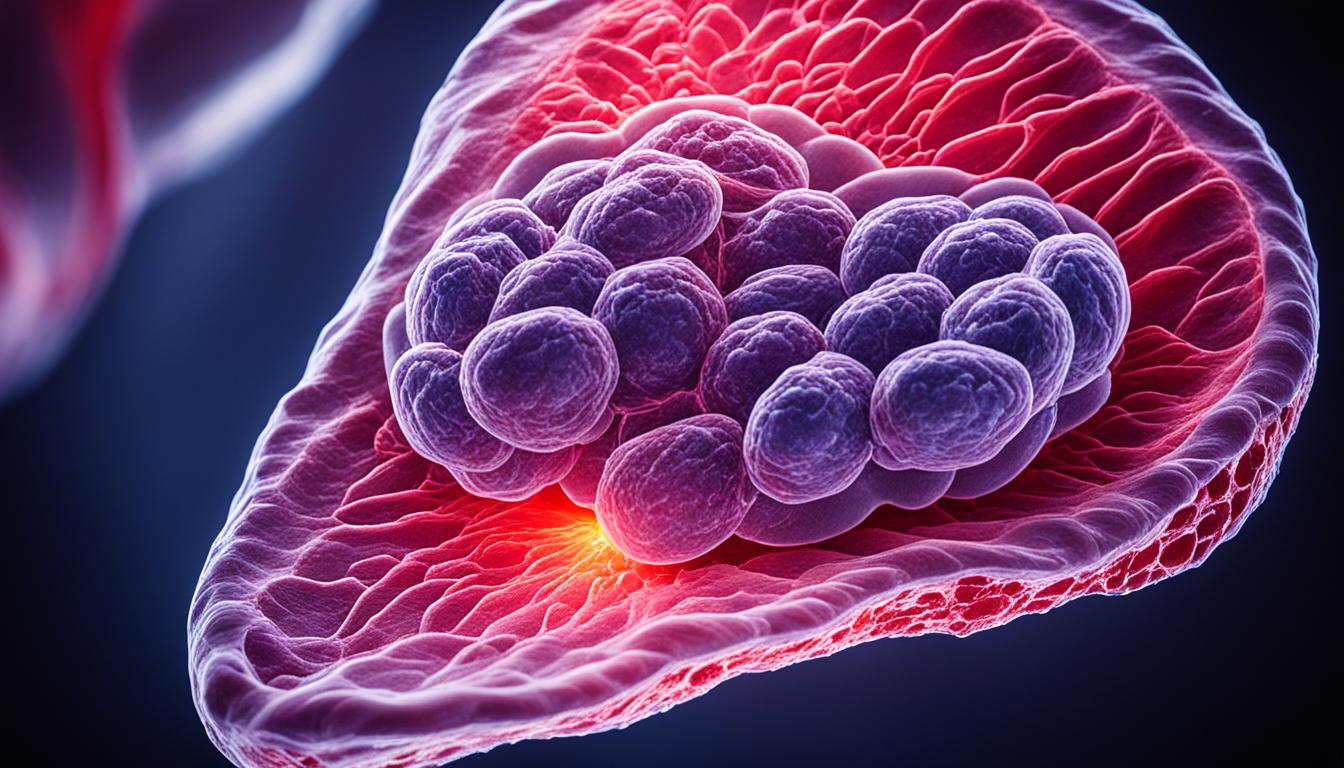Glossodynia, or burning mouth syndrome, makes your mouth feel like it’s on fire. There’s no visible disease. This condition is a mystery to doctors, often leading to long-term oral pain.
Doctors still don’t know what causes glossodynia. They link it to things like bad nutrition, mental health issues, and dry mouth. One might also blame diabetes, menopause, or other hormone problems. To diagnose glossodynia, doctors rule out other oral pain causes. They do this by careful checking and tests.
Sadly, the usual ways to treat glossodynia don’t work well. But, there’s hope in stem cell therapy. This new approach could help ease the suffering of glossodynia patients.
Key Takeaways:
- Glossodynia, or burning mouth syndrome, is a condition characterized by a scorching sensation in the mouth.
- It is a medically unexplained symptom and can cause chronic oral pain and discomfort.
- Possible causes of glossodynia include nutritional disorders, psychiatric illness, allergies, xerostomia, diabetes, menopause, and other endocrine disorders.
- Diagnosis of glossodynia involves excluding other possible causes of oral pain through clinical examinations and laboratory tests.
- Stem cell therapy is a promising treatment option for glossodynia, offering new hope for relief from chronic oral pain and discomfort.
Symptoms of Glossodynia
Glossodynia, or burning mouth syndrome, has various symptoms. They can vary from person to person. The main symptoms are:
- Burning or scalding sensation: A key sign is feeling like your mouth is burning or scalding. It often happens on the tongue, lips, or inside the cheeks.
- Tingling or numbness: Some people with glossodynia feel tingling or numbness in their mouth.
- Worsening throughout the day: Symptoms may get worse as the day goes on, making things more uncomfortable by evening.
- Exacerbated by triggers: Hot food, drinks, and stress might make the burning sensation worse.
- Constant or intermittent pain: It can feel like a constant pain or come and go in episodes.
- Dry mouth: Those with glossodynia might find their mouth feeling very dry, which only adds to their discomfort.
- Altered taste sensation: Some may notice changes in how food tastes, such as less flavor or a different taste.
- Mouth discomfort or soreness: The overall feeling can be one of mouth discomfort or soreness, impacting quality of life.
To look at the common symptoms in an easy way, check out the table below:
| Symptom | Description |
|---|---|
| Burning or scalding sensation | A sensation of heat or burning in the mouth, particularly on the tongue, palate, lips, and gingiva. |
| Tingling or numbness | An unusual tingling or numbing feeling in the oral cavity. |
| Worsening throughout the day | The symptoms intensify as the day progresses, leading to increased discomfort. |
| Exacerbated by triggers | Specific factors like spicy foods, hot beverages, or stressful situations can worsen the symptoms. |
| Constant or intermittent pain | Glossodynia can manifest as enduring pain or episodic bouts of discomfort. |
| Dry mouth | A condition where the mouth lacks sufficient saliva, resulting in a parched sensation. |
| Altered taste sensation | Changes in the perception of taste, causing food to taste differently or less enjoyable. |
| Mouth discomfort or soreness | An overall uncomfortable or sore feeling in the mouth. |
Knowing the signs of glossodynia is key for its proper care. If you have these symptoms, get a doctor’s opinion and explore treatment options. Take care of your oral health.
Causes and Diagnosis of Glossodynia
No one knows for sure what causes glossodynia, but many things might play a part. Not eating right, mental health issues, allergies, dry mouth, diabetes, menopause, and other hormonal problems can lead to glossodynia. These can make your mouth and tongue hurt a lot, feel uncomfortable, and extra sensitive.
Doctors use a step-by-step method to figure out if glossodynia is the problem. They check your mouth, looking at your tongue, gums, and lips. This step can find out if there’s an issue like a mouth disease that’s causing your pain. They might also do some tests to rule out health problems that could show up as glossodynia.
Common Causes of Glossodynia
| Cause | Description |
|---|---|
| Nutritional Disorders | Inadequate intake of essential nutrients can contribute to glossodynia. |
| Psychiatric Illness | Conditions such as anxiety and depression have been linked to glossodynia. |
| Allergies | Allergic reactions to certain substances, including food, may cause tongue pain and mouth discomfort. |
| Xerostomia (Dry Mouth) | A lack of saliva production can lead to tongue sensitivity and chronic oral pain. |
| Diabetes | People with diabetes may experience glossodynia as a complication of the condition. |
| Menopause and Other Endocrine Disorders | Hormonal changes during menopause and other endocrine disorders can contribute to glossodynia. |
To find out if glossodynia is the problem, doctors look at your past, what’s happening now, and your health info. This detailed look can rule out other causes of mouth pain. Then, they can set up the right treatment plan.
Stem Cell Therapy as a Treatment Option for Glossodynia
Stem cell therapy brings hope to those with glossodynia. This is a condition where patients feel constant oral pain and tongue sensitivity. The treatment uses the power of stem cells to reduce discomfort and enhance oral health.
When treating glossodynia with stem cell therapy, cells are placed right in the mouth’s painful areas. This process helps repair the tissue and decreases swelling. The goal is to treat the root cause of the condition, bringing long-term relief to those with burning mouth syndrome and tongue pain.
At present, the use of stem cells to treat glossodynia is still in its early phase. Yet, the first studies show it could really help. They point to less pain and better life quality for patients. Ongoing research and trials are shaping a clearer view of what stem cell therapy can do for glossodynia.

